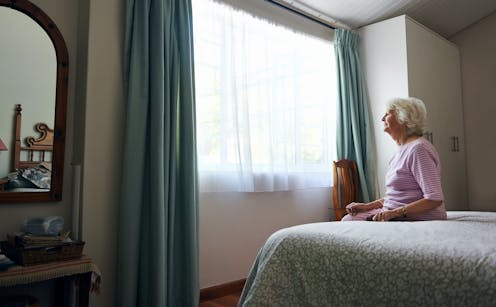Voluntary assisted dying is different to suicide. But federal laws conflate them and restrict access to telehealth
- Written by Michaela Estelle Okninski, Lecturer of Law, University of Adelaide

Voluntary assisted dying is now lawful in every Australian state and will soon begin in the Australian Capital Territory[1].
However, it’s illegal to discuss it via telehealth[2]. That means people who live in rural and remote areas, or those who can’t physically go to see a doctor, may not be able to access the scheme.
A federal private members bill, introduced to parliament last week, aims to change this. So what’s proposed and why is it needed?
What’s wrong with the current laws?
Voluntary assisted dying doesn’t meet the definition of suicide under state laws.
But the Commonwealth Criminal Code prohibits[3] the discussion or dissemination of suicide-related material electronically.
This opens doctors to the risk of criminal prosecution if they discuss voluntary assisted dying via telehealth.
Successive Commonwealth attorneys-general have failed to address the conflict between federal and state laws, despite persistent calls from state attorneys-general for necessary clarity[4].
This eventually led to voluntary assistant dying doctor Nicholas Carr[5] calling on the Federal Court of Australia to resolve this conflict. Carr sought a declaration to exclude voluntary assisted dying from the definition of suicide under the Criminal Code.
Read more: Voluntary assisted dying will begin in WA this week. But one Commonwealth law could get in the way[6]
In November, the court declared[7] voluntary assisted dying was considered suicide for the purpose of the Criminal Code. This meant doctors across Australia were prohibited from using telehealth services for voluntary assisted dying consultations.
Last week, independent federal MP Kate Chaney introduced a private members bill[8] to create an exemption for voluntary assisted dying by excluding it as suicide for the purpose of the Criminal Code. Here’s why it’s needed.
Not all patients can physically see a doctor
Defining voluntary assisted dying as suicide in the Criminal Code disproportionately impacts people living in regional and remote areas. People in the country rely on[9] the use of “carriage services”, such as phone and video consultations, to avoid travelling long distances to consult their doctor.
Other people with terminal illnesses, whether in regional or urban areas, may be suffering intolerably and unable to physically attend appointments with doctors.
The prohibition against telehealth goes against the principles[10] of voluntary assisted dying, which are to minimise suffering, maximise quality of life and promote autonomy.
Doctors don’t want to be involved in ‘suicide’
Equating voluntary assisted dying with suicide has a direct impact on doctors, who fear[12] criminal prosecution due to the prohibition against using telehealth.
Some doctors may decide not to help patients who choose voluntary assisted dying, leaving patients in a state of limbo.
The number of doctors actively participating in voluntary assisted dying is already low[13]. The majority of doctors are located in metropolitan areas or major regional centres, leaving some locations with very few doctors participating in voluntary assisted dying.
Read more: Voluntary assisted dying is legal in Victoria, but you may not be able to access it[14]
It misclassifies deaths
In state law, people dying under voluntary assisted dying have the cause of their death registered as “the disease, illness or medical condition that was the grounds for a person to access voluntary assisted dying”, while the manner of dying[15] is recorded as voluntary assisted dying.
In contrast, only coroners in each state and territory can make a finding of suicide as a cause of death.
In 2017, voluntary assisted dying was defined in the Coroners Act 2008 (Vic)[16] as not a reportable death, and thus not suicide.
The language of suicide is inappropriate for explaining how people make a decision to die with dignity under the lawful practice of voluntary assisted dying.
There is ongoing taboo and stigma attached to suicide. People who opt for and are lawfully eligible to access voluntary assisted dying should not be tainted with the taboo that currently surrounds suicide.
So what is the solution?
The only way to remedy this problem is for the federal government to create an exemption in the Criminal Code to allow telehealth appointments to discuss voluntary assisted dying.
Chaney’s private member’s bill is yet to be debated in federal parliament.
If it’s unsuccessful, the Commonwealth attorney-general should pass regulations to exempt voluntary assisted dying as suicide.
A cooperative approach to resolve this conflict of laws is necessary to ensure doctors don’t risk prosecution for assisting eligible people to access voluntary assisted dying, regional and remote patients have access to voluntary assisted dying, families don’t suffer consequences for the erroneous classification of voluntary assisted dying as suicide, and people accessing voluntary assisted dying are not shrouded with the taboo of suicide when accessing a lawful practice to die with dignity.
Failure to change this will cause unnecessary suffering for patients and doctors alike.
References
- ^ Australian Capital Territory (www.justice.act.gov.au)
- ^ telehealth (www.mbsonline.gov.au)
- ^ prohibits (www.aph.gov.au)
- ^ clarity (www.abc.net.au)
- ^ Nicholas Carr (www.abc.net.au)
- ^ Voluntary assisted dying will begin in WA this week. But one Commonwealth law could get in the way (theconversation.com)
- ^ declared (search2.fedcourt.gov.au)
- ^ introduced a private members bill (parlinfo.aph.gov.au)
- ^ rely on (www.ama.com.au)
- ^ principles (www.legislation.vic.gov.au)
- ^ Jeffrey M Levine/Shutterstock (www.shutterstock.com)
- ^ fear (eprints.qut.edu.au)
- ^ low (www.safercare.vic.gov.au)
- ^ Voluntary assisted dying is legal in Victoria, but you may not be able to access it (theconversation.com)
- ^ manner of dying (theconversation.com)
- ^ Coroners Act 2008 (Vic) (www8.austlii.edu.au)

















